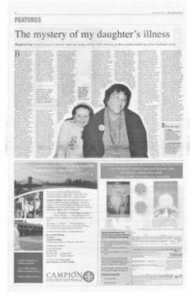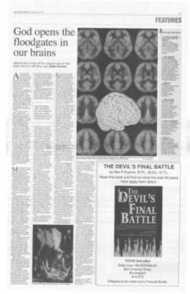Page 4, 9th February 2007
Page 4

Report an error
Noticed an error on this page?If you've noticed an error in this article please click here to report it.
Tags
Share
Related articles
Bishop Pleads For Peace In Sudan
Khartoum Accused Of Islamising The South
Africa
Sudan Churches: A Clarification
Cafod Acts On 'forgotten War'
Sudanese 'play games' with peace proposals
BY WILL GORE
THE SUDANESE government has been "playing games" with its people by failing to honour a peace agreement, according to a local Catholic bishop.
Auxiliary Bishop Daniel Adwok of Khartoum said that the Islamist regime of President Omar al Bashir was "not at all serious" about the Comprehensive Peace Agreement (CPA), a January 2005 power-sharing plan between the Sudanese government and a rebel movement in southern Sudan.
The bishop accused the authorities of making little effort to curb militia armies, which clashed with forces linked to the Sudanese People's Liberation Army (SPLA) in the southern town of Malalcal, where more than 300 people were reported to have been killed.
Bishop Adwok said: "In Khartoum, the government is playing a game — they are just letting. things early on as they are. They are not at all serious about addressing the real issues. And the militia is free to do whatever they want."
He added that the conflict had been caused by the government's failure to hand over control of Malakal to the SPLA, a process that that should have been completed last summer, according to the CPA.
The bishop's comments echo those of Cardinal Gabriel Zubeir Wako, Archbishop of Khartoum, who said that the CPA "has been translated into agreements to `peacefully' continue war and prepare for war".
Bishop Adwok also criticised the government over its failure to help the large number of displaced Sudanese — many of whom are Christians — as they attempt to return to their homes in the south, now the violence that once blighted the area has become more sporadic.
He described seeing crowds of Sudanese who had left displacement camps stuck 150 miles south of Khartoum in Kosti. desperately awaiting barges on the River Nile to take them further south.
The bishop claimed the govern ment did not want the displaced to return home as it feared this would boost support for the granting of independence to southern Sudan.
A refetraidum on whether to officially recognise the independence of the south was enshrined in the CPA. The agreement states that the referendum will take place in 2011.
John Pontifex of Aid to the Church in Need, a Catholic charity that helps persecuted Christians throughout the world, said the bishop was right to question the government over their failure to enforce the CPA.
"It is clear the government should do more to help the displaced Sudanese. These are people with little resources and they need help from the government, help they are not currently receiving," he said.
Mr Pontifex also said he supported the bishop's criticism of the treatment of Christians in Khartoum.
"There is no widespread persecution of Christians in Sudan, it is rather more insidious than that. Christians are denied basic human rights, as they are denied the chance to freely practise their faith in public." he said.
The north of Khartoum is subject to Sharia law that forbids the existence of churches.
But with over one million Christians living in and around the capital enforcing Sharia law is proving difficult.
blog comments powered by Disqus

















